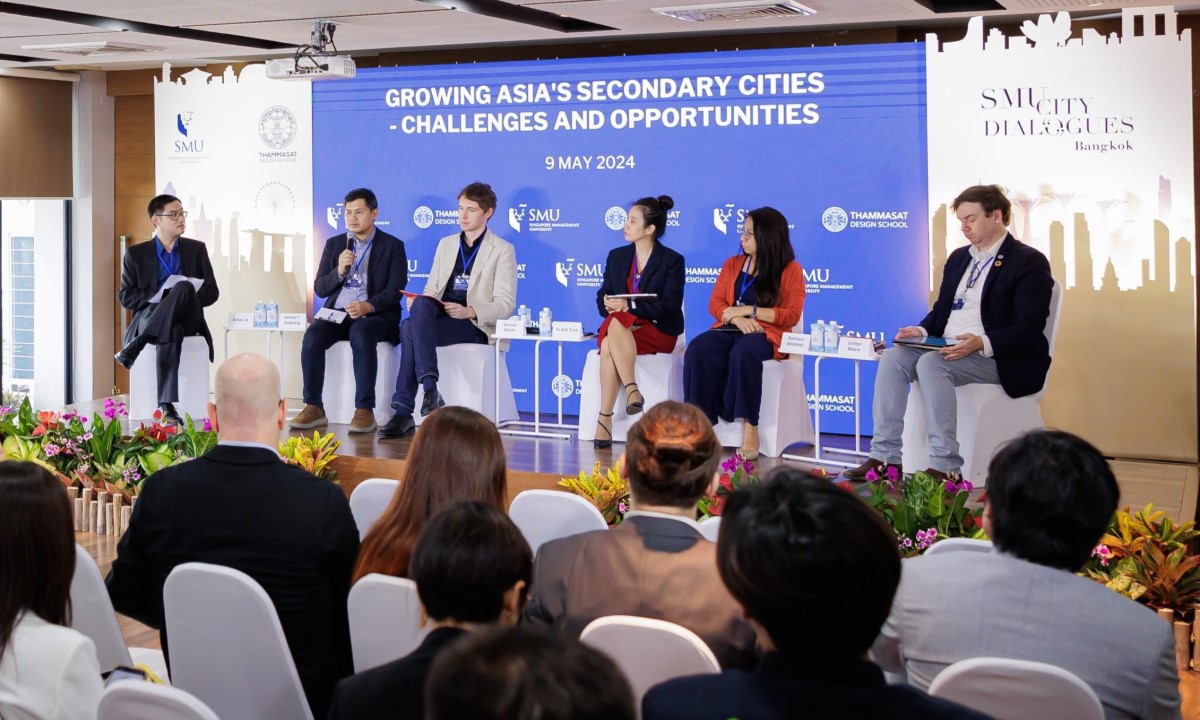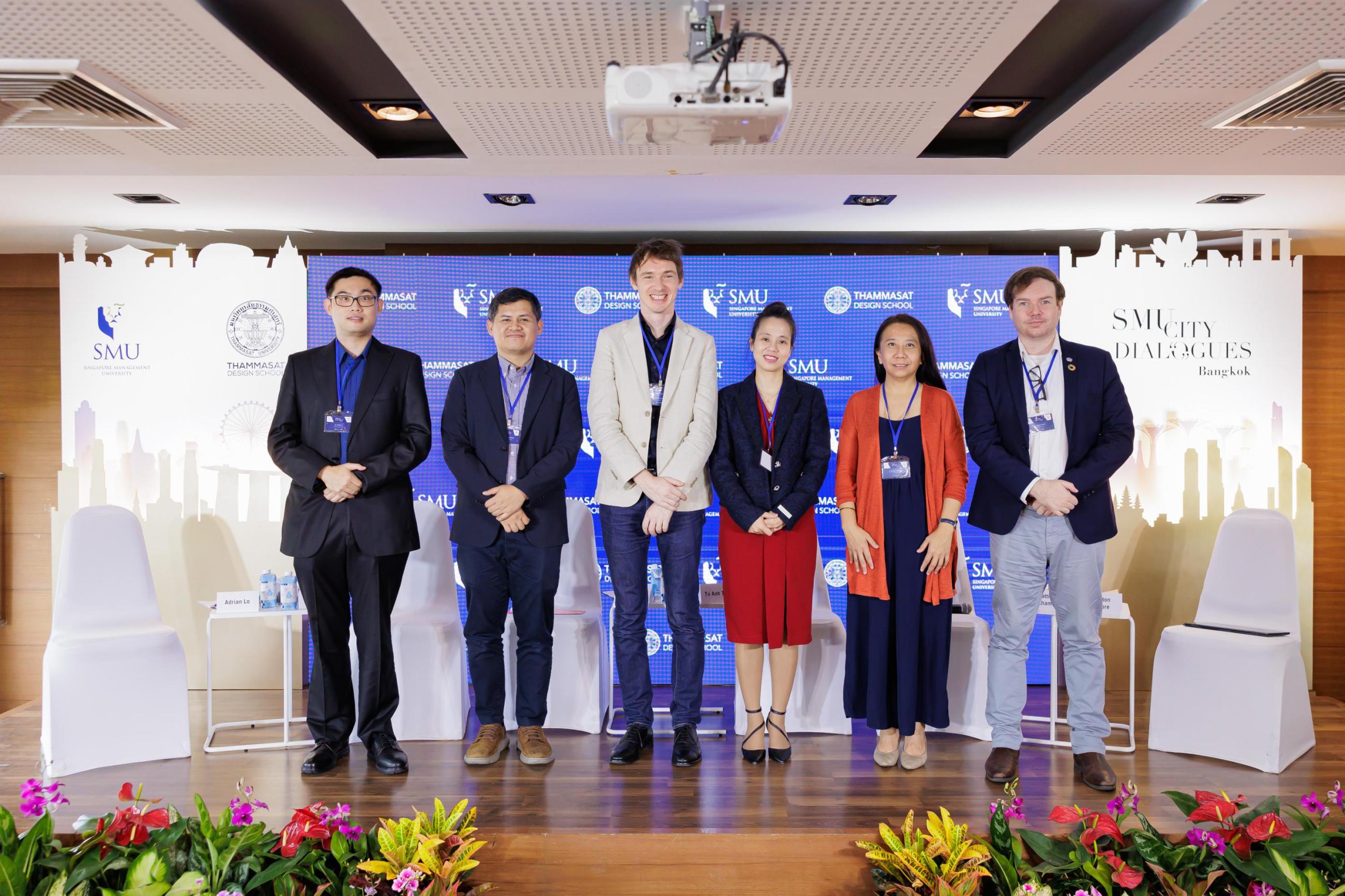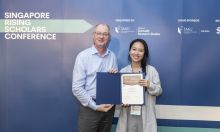
Projections indicate that by 2030, there will be 70 million additional urban dwellers in ASEAN cities, with 56% of its entire population urbanised.
This is the backdrop for the launch of the inaugural overseas edition of SMU City Dialogues taking place in Bangkok on 9 May 2024.
The SMU City Dialogues series was conceived in 2019 as a platform to gather leaders from industry, government, and academia for candid and uninhibited discussions around the ideation of innovative solutions for tackling today’s global challenges, with the aim of influencing policy and industry.
In line with SMU’s mission to foster knowledge-sharing and regional collaboration – in its position as a gateway university in Asia – the inaugural overseas SMU City Dialogues was centred around the theme “Growing Asia’s Secondary Cities – Challenges & Opportunities.”
Ensuring that no one is left behind
The keynote address was given by Mr Riccardo Maroso, programme manager of the United Nations Human Settlement Programme (UN-Habitat), Bangkok Programme Office, Regional Office for Asia and the Pacific (ROAP).
He shared key insights from the ASEAN Sustainable Urbanisation Strategy (ASUS), highlighting that by 2030, there would be 70 million additional urban dwellers in ASEAN cities.
“The main demographic and economic growth across ASEAN is happening in smaller ‘middleweight’ urban areas, providing the opportunity for balanced urban and spatial development and regional integration,” he explained.
“Nevertheless, secondary cities face several challenges and will require strategic support and investments to plan and manage sustainable development and provide quality services and livelihood opportunities for all the residents.”
Concluding his keynote speech, Mr Maroso shared that the attention of key international organisations such as ASEAN and the UN, the increasing research and dialogues within academia and the growing efforts from countries across ASEAN are positive steps toward an integrated approach to policy development and action for sustainable urban development that leaves no one and no place behind.
Promoting sustainable urbanisation in secondary cities
Following the keynote address was a panel session moderated by Dr Adrian Lo, Director, Urban Design & Development International Programme, Faculty of Architecture & Planning, Thammasat University (Thailand).
The panel consisted of regional experts including Dr Adiwan F Aritenang, Director, Postgraduate Programme, Urban & Regional Planning Programme, Institut Teknologi Bandung (Indonesia); Mr Clinton Moore, Urban Climate Change Specialist at the United Nations Economic and Social Commission for Asia and the Pacific (UNESCAP) (Thailand); Associate Professor Orlando Woods, Director, SMU Urban Institute (Singapore); Dr Rattikarn Khambud, an Urban Planner at the Department of Public Works & Town & Country Planning, Ministry of Interior (Thailand); and Dr Tu Anh Trinh, Director, Institute of Smart City & Management, University of Economics Ho Chi Minh City (Vietnam).
The panel tackled the issue that there is no standard way of classifying cities into primary or secondary categories, given that cities differ from each other in every country in scale and scope.
Mr Moore shared: “Resourcing is different from a capital city and a small city. The level of thinking, the type of talent that the city attracts are different, and all these go into the mix of how well the city can function and govern and garner support.
“From a UN point of view, we are very keen to put national frameworks across the region. Regional buy-in is important. The work that ASEAN is doing is very important to drive and promote sustainable urbanisation in secondary cities.”
In addition, Mr Moore expressed his belief that the future of cities and countries depends on the plans made. While it is encouraging to see research on secondary cities gain more traction, and see more funding and documentation, we need the future generation to take this onboard.
“Leaders such as universities and institutions need to initiate change in the mindsets of citizens to effect necessary change,” added Dr Aritenang, of Institut Teknologi Bandung.
SMU’s Assoc Prof Woods also shared that all cities are increasingly becoming valuable to the private sector because of the data they produce. Secondary cities can also be valuable to the right kinds of investors.

In his closing speech, Asst Prof Asan Suwanarit, Dean of Thammasat University’s Faculty of Architecture & Planning (also known as Thammasat Design School) said, “We cannot look at these secondary cities in isolation.”
“We need to look at them as a network with other cities and the relationship of the non-physical aspects as well, such as economic, social, and cultural, that can cause environmental issues. That will give a more comprehensive understanding of the relationship between cities, of how each city can complement and impact each other.”
See also: SMU City Dialogues Goes Regional | SMU Newsroom;
Growth opportunities exponential for secondary cities; greater integration and networks needed to combat existing challenges | SMU Newsroom


